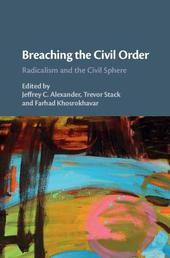
|
Breaching the Civil Order: Radicalism and the Civil Sphere
Hardback
Main Details
| Title |
Breaching the Civil Order: Radicalism and the Civil Sphere
|
| Authors and Contributors |
Edited by Jeffrey C. Alexander
|
|
Edited by Trevor Stack
|
|
Edited by Farhad Khosrokhavar
|
| Physical Properties |
| Format:Hardback | | Pages:678 | | Dimensions(mm): Height 235,Width 155 |
|
| ISBN/Barcode |
9781108427234
|
| Classifications | Dewey:303.484 |
|---|
| Audience | | Professional & Vocational | |
|---|
| Illustrations |
Worked examples or Exercises; 8 Line drawings, black and white
|
|
Publishing Details |
| Publisher |
Cambridge University Press
|
| Imprint |
Cambridge University Press
|
| Publication Date |
12 December 2019 |
| Publication Country |
United Kingdom
|
Description
It is not only a paradox but something of an intellectual scandal that, in an era so shaken by radical actions and ideologies, social science has had nothing theoretically new to say about radicalism since the middle of the last century. Breaching the Civil Order fills this void. It argues that, rather than seeing radicalism in substantive terms - as violent or militant, communist or fascist - radicalism should be seen more broadly as any organized effort to breach the civil order. The theory is brilliantly made flesh in a series of case studies by leading European and American social scientists, from the destruction of property in the London race riots to the public militancy of Black Lives Matter in the US, the performative violence of the Irish IRA and the Mexican Zapatistas to the democratic upheavals of the Arab Spring, and from Islamic terrorism in France to Germany's right-wing populist Pegida.
Author Biography
Jeffrey C. Alexander is the Lillian Chavenson Saden Professor of Sociology at Yale University, Connecticut. His writings over the last three decades have been foundational to the new discipline of cultural sociology, and his seminal work The Civil Sphere (2006) has come to be regarded as the major sociological theory of democracy. He founded and co-directs the Yale Center for Cultural Sociology. He has authored and edited more than fifty books, and his work has been translated in almost thirty languages. Trevor Stack is Senior Lecturer in Spanish and Latin American Studies at the University of Aberdeen. He is Director of the inter-disciplinary Centre for Citizenship, Civil Society and Rule of Law (CISRUL), which focuses on the study of political concepts in the world. Currently he leads a large (Economic and Social Research Council) ESRC project on Activism in Violent Regions, as well as an EU Marie Curie COFUND grant on Political Concepts in the World. Farhad Khosrokhavar is retired professor at the Ecole des Hautes Etudes en Sciences Sociales, Paris and a director of Observatoire de la radicalisation in the Fondation de la Maison des Sciences de l'Homme, Paris. He has published twenty-seven books, five of which are in English; his work has been translated into ten languages.
Reviews'This book brings together a fascinating range of contemporary case studies around a central provocative theme: what makes collective actors breach the civil order? And what happens when they do? I particularly appreciate the attention to the nature of the 'civil sphere' and its translation into real world 'flesh and blood' examples of radical action. The intelligent analytical framing of the case studies by the editors makes this a valuable and stimulating contribution to scholarship on contemporary politics and society.' Cristina Flesher Fominaya, Loughborough University 'Civil sphere theory (CST) is one of the most important and exciting advances to reshape the study of politics and society in the last fifteen years. Decisively refuting the notion that radical politics have no place in the framework of CST, this groundbreaking volume by more than a dozen leading theorists places radicalism front and center. Pushing us to rethink what we thought we already understood, it offers fresh insights into political radicalism and its complex and varying relationship to civil solidarity. At the same time, its creative reexamination of radicalism serves to revise, develop, and expand CST in promising new directions. Breaching the Civil Order is required reading for everyone who wishes to grasp social solidarity by the root. Chad Alan Goldberg, University of Wisconsin, Madison
|